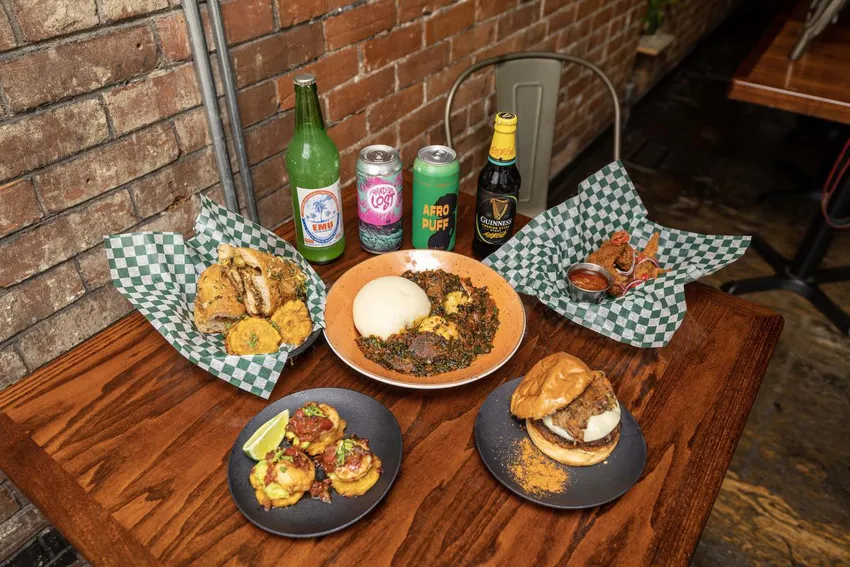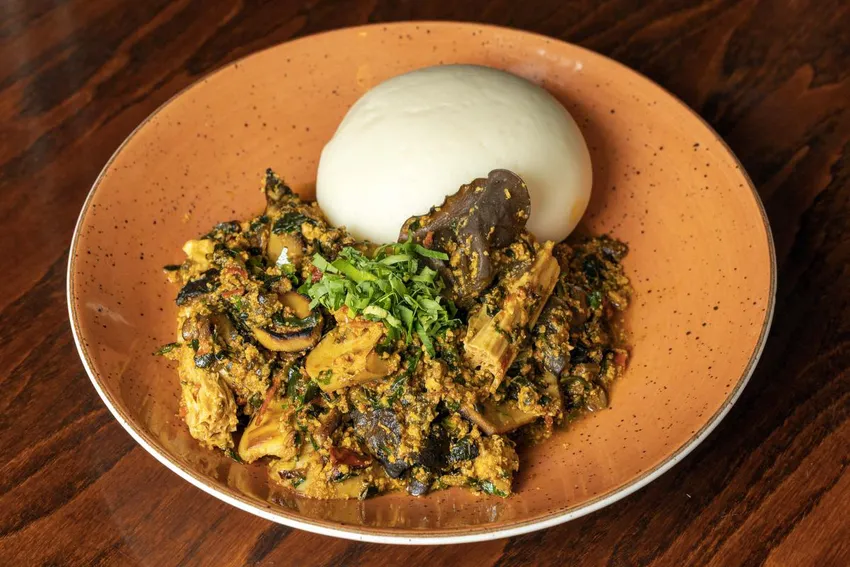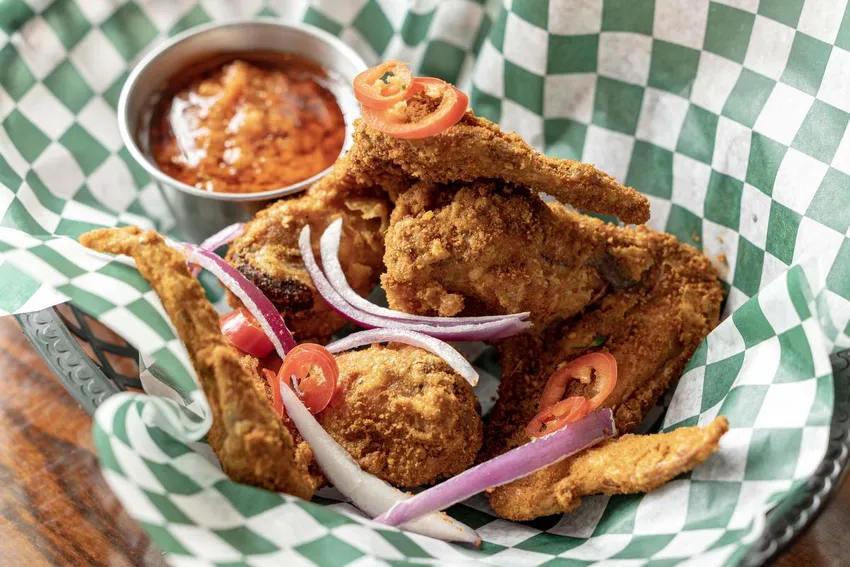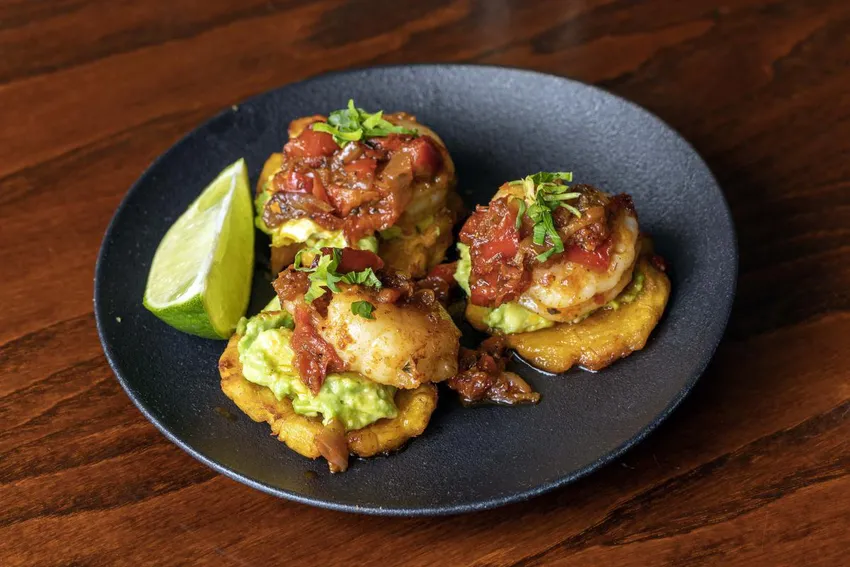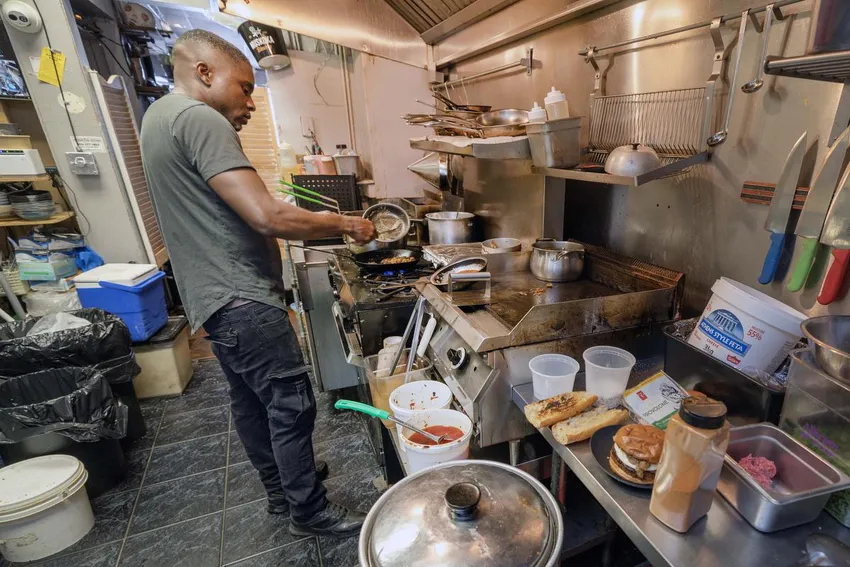When diners asked chef Victor Ugwueke for more plant-based options, he turned his attention to the dish he’s most proud of — the beef egusi.
The stew, named after the melon seeds used to thicken it, is just one example of the “new” West African fare that Ugwueke serves at Afrobeat Kitchen, his months-old Parkdale restaurant at 1510 Queen. St. W. He makes it “as close to how our grandmothers would back home in the village,” using beef, smoked crayfish and salted stockfish (dried cod). But in his plant-based counterpart, meaty mushrooms and soy skins take centre stage.
“Usually, at a standard Nigerian restaurant, meat is an option of boneless or ‘assorted,’ which is all the organs, skin, bone-in, really a whole animal philosophy, where we make sure nothing is wasted and that kind of sustainable eating tradition,” he said.
“With a lot of experiments, we landed on this mix of (king oyster) mushrooms and wood ear mushrooms, which has that tendon or cartilage kind of bite that’s my favourite — we call it ‘biscuit bone’ back home — and soy skin, which for customers who haven’t paid attention to what their table ordered, just thought was super well-cooked tripe — a win!”
The idea for vegan egusi draws on his experience while living in Beijing in the mid-2000s. It was there he fell in love with malatang, a street food of mixed meats, vegetables, tofu and mushrooms simmered in a numbing peppercorn broth.
In his dish, dried seaweed is used as a base for a dashi (Japanese soup stock) to capture the salty, briny flavour from cod. And dried shiitake mushrooms do double duty to provide a meaty texture and add to the umami-rich base. A hint of gochujang (Korean fermented red chili paste) adds an additional punch of spicy savouriness. Served with a side of pounded yam, a customary doughy vehicle to pick up bits of the soup, this dish is a hearty, welcome addition to Parkdale’s culinary strip – as is the restaurant itself.
Opened in late December in a former pub, Afrobeat Kitchen is reminiscent of the wave of hip, independently owned restaurants – Parts & Labour, Blondie’s, Chantecler, to name a few – that popped up in the neighbourhood in the late aughts. The culmination of opening a brick and mortar storefront comes after Ugwueke spent his life building his culinary resume.
He was raised in Lagos and worked at his mother’s restaurant, which served traditional local food. At first he’d go after school to bring home food for his brothers, but as he got older he washed dishes and worked the bar before learning the recipes that his mom had had passed down to her.
“The pots in her kitchen not only fed neighbours over the years, but kept a roof over our head, and me and my brothers in school,” he said. “It wasn’t the most luxurious way to grow up, but it was plenty enough. Plus, we learnt the importance of hard work.”
At 20, he opened an offshoot of his mom’s restaurant on Lagos Island before moving to Beijing for a few years followed by London in 2008, where he worked at a gastropub. He came to Toronto in 2010 and continued working in kitchens, at places such as Tabule and Enoteca Sociale. Finally, during the pandemic, he started Afrobeat Kitchen pop-up – building up a following for his personalized twists on classic West African cooking.
And while he calls his cooking “new,” he lights up when talking about the origin stories of each ingredient and flavour, and how they ended up on the menu.
Case in point, the history lesson he gives when discussing another popular item on his menu: the kewele tostones, which combines the Ghanaian street food of fried plantains spiced with chili and ginger with the Afro-Latinx way of smashing plantains into fat coins before frying.
“The history of how plantains originated in Southeast Asia, and became a staple in West Africa, and were brought over to South America by the Portuguese in the 15th century is just an example of (the idea that) borders are not lines that divide us, but seams that connect us,” he said.
Ugwueke says his hope with Afrobeat is to help diners shake the perception that food from the African diaspora is limited to cheap eats.
“There’s still some education (to be done) because not everyone will get what we’re doing, because in general immigrant food, and especially Black work, talent and knowledge is historically devalued (in Canada) like everywhere else, both in the industry itself, which is complicit in expecting to access cheap labour from Black and Brown bodies as staff, and some customers who don’t understand why a $5 jerk chicken special was never an equitable or healthy business model for immigrant communities to build wealth,” he explained.
“So many of the dishes I’m cooking right now feel special, they are personal and ancestral. It means a lot to me after working in so many different restaurants to make food that is my birthright.”


